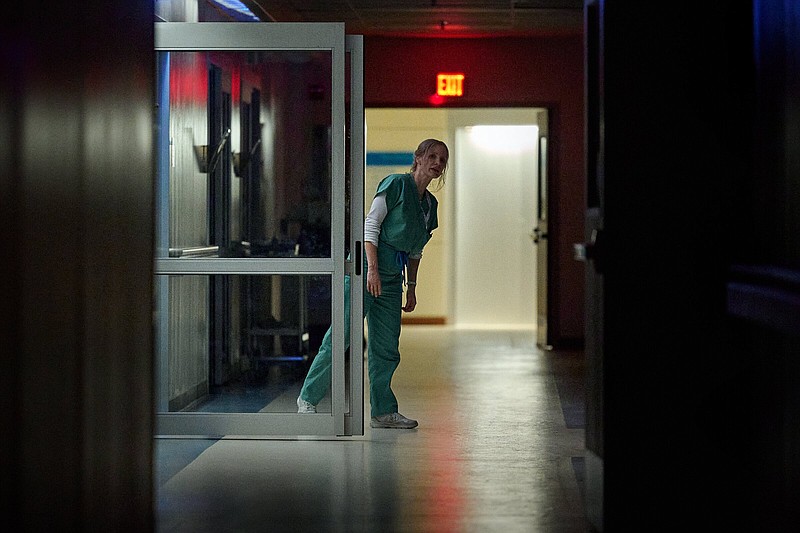Tobias Lindholm is a beguiling filmmaker whose storytelling talents are particularly suited toward a kind of methodical procedural, be it fictionalized ("A Hijacking"; "A War"), or not (the HBO series "The Investigation"). "The Good Nurse," his first American-produced film, a fact-based drama about a nurse suspected of killing his patients in different hospitals for years before finally being arrested, offers the director a chance to exploit those skills with a top-rate pair of leads, to potent effect.
Those leads would be Eddie Redmayne, playing real-life killer Charlie Cullen, the nurse in question, a quiet, seemingly caring, self-deprecating sociopath; and Jessica Chastain, as Amy Loughren, the beleaguered nurse and co-worker who first befriends Charlie as he begins to work at her hospital, and ends up instrumental in finally getting him captured. Lindholm, working from a taut screenplay by Krysty Wilson-Cairns (from the nonfiction book by Charles Graeber), doesn't traffic in dramatic cliches or histrionic flourishes. There are few combative scenes here, and fewer still where characters spin into scene-stealing exaltations -- save for perhaps one from Redmayne near the end, when first being questioned by the authorities, in which his character's suppressed psychopathic intensity terrifyingly reveals itself.
In place of such dramatic fodder, there are the simple facts of the case: Starting in the mid-'90s, Cullen was able to move from hospital to hospital, killing dozens of his patients (one estimate has his death toll topping 400), all without ever being arrested, reprimanded, or even flagged by his former workplaces, the authorities at many of which strongly suspected him of malice, but were too afraid of the potential financial culpability in exposing him to make him stop.
Working more or less in plain sight, Cullen, the film suggests, was so good at killing his patients because he was the perfect evil mixture of exterior kind and caring, and interior focused and sociopathic: Patients under his care would love him to death, even as he was bringing theirs about. His preferred method of killing was to slowly inject extra insulin into his patients' otherwise clean saline IV bags, until their bodies, often weakened from age and surgery, would go haywire. This left him in a position to be offering them "outstanding" care, while ensuring their eventual deaths.
Nurse Amy, meanwhile, a single mother working the night shift and coming home to help get her two young daughters off to school in the mornings, has problems of her own -- a worsening heart condition that she's trying to keep under wraps until her health insurance finally kicks in after her initial year of employment at the hospital. At first, she welcomes Charlie's earnest attempts to comfort her, helping her through her own health episodes at work, so she can keep her job. But when patients start coding on the regular, and Charlie becomes the lead suspect for a pair of local detectives (Noah Emmerich and Nnamdi Asomugha), Amy begins to question her friend, and feels the need to do something to stop him.
Lindholm's film is soberly effective, if dramatically tamped down. That kind of focused severity limits the emotional register for Chastain and Redmayne to a degree, but it also encourages the pair of powerhouses to internalize their performances -- Redmayne is a study in concealed ferocity, his face a mask of empathy, his manner gentle and compassionate -- in a way that challenges both of them to audacious work.
True to form, Lindholm positions the film less as a searing drama, and more as an indictment of a privatized health system that values corporate self-protection over stopping a serial killer from moving freely through the healthcare system (not to mention the callousness with which the hospital treats their own employees, withholding medical coverage for a full year, an almost ludicrous cruelty for a supposed health-based organization).
That American medicine has largely fallen into this brand of privatized health-for-profit misery stands in marked contrast to Lindholm's home country of Denmark, which offers fully socialized healthcare to all its citizens. As a rebuke against the U.S. system, he couldn't have found a better example of just how badly we've gotten this wrong.
